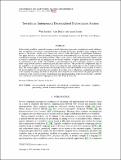Files in this item
Towards an autonomous decentralized orchestration system
Item metadata
| dc.contributor.author | Jaradat, Ward | |
| dc.contributor.author | Dearle, Alan | |
| dc.contributor.author | Barker, Adam | |
| dc.date.accessioned | 2016-09-20T23:34:22Z | |
| dc.date.available | 2016-09-20T23:34:22Z | |
| dc.date.issued | 2016-08-10 | |
| dc.identifier | 211254477 | |
| dc.identifier | 67435f77-3967-4809-8cbd-d41c18a6240d | |
| dc.identifier | 84945268921 | |
| dc.identifier | 000382651600011 | |
| dc.identifier.citation | Jaradat , W , Dearle , A & Barker , A 2016 , ' Towards an autonomous decentralized orchestration system ' , Concurrency and Computation : Practice and Experience , vol. 28 , no. 11 , pp. 3164-3179 . https://doi.org/10.1002/cpe.3655 | en |
| dc.identifier.issn | 1532-0634 | |
| dc.identifier.uri | https://hdl.handle.net/10023/9534 | |
| dc.description.abstract | Orchestrating workflows needed for modern scientific data analysis presents a significant research challenge: they are typically executed in a centralized manner such that all data pass through a single compute server known as the engine, which causes unnecessary network traffic that leads to a performance bottleneck. This paper presents a scalable decentralized orchestration system that relies on a functional, high‐level data coordination language for executing workflows. This system consists of distributed execution engines, each of which is responsible for executing part of the overall workflow. It exploits parallelism in the workflow by partitioning it into smaller sub‐workflows and determines the most appropriate engines to execute them using network resource monitoring and placement analysis. This permits the computation logic of the workflow to be moved towards the services providing the data, which improves the overall execution time. The system supports data‐driven execution that allows each sub‐workflow to be executed as soon as the data needed for its execution become available from other sources. Therefore, a scheduling mechanism is not required to manage the order in which the sub‐workflows are orchestrated. This paper provides an evaluation of the proposed system, which demonstrates that decentralized orchestration provides scalability over centralized orchestration. | |
| dc.format.extent | 1034464 | |
| dc.language.iso | eng | |
| dc.relation.ispartof | Concurrency and Computation : Practice and Experience | en |
| dc.subject | Service-oriented architecture | en |
| dc.subject | Decentralized orchestration | en |
| dc.subject | Data-centric workflows | en |
| dc.subject | Partitioning | en |
| dc.subject | Network resource monitoring | en |
| dc.subject | Placement analysis | en |
| dc.subject | QA75 Electronic computers. Computer science | en |
| dc.subject | NDAS | en |
| dc.subject | BDC | en |
| dc.subject | R2C | en |
| dc.subject.lcc | QA75 | en |
| dc.title | Towards an autonomous decentralized orchestration system | en |
| dc.type | Journal article | en |
| dc.contributor.institution | University of St Andrews. School of Computer Science | en |
| dc.contributor.institution | University of St Andrews. Office of the Principal | en |
| dc.identifier.doi | https://doi.org/10.1002/cpe.3655 | |
| dc.description.status | Peer reviewed | en |
| dc.date.embargoedUntil | 2016-09-20 |
This item appears in the following Collection(s)
Items in the St Andrews Research Repository are protected by copyright, with all rights reserved, unless otherwise indicated.

